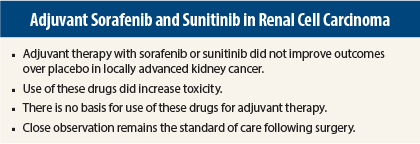Adjuvant therapy with sorafenib (Nexavar) or sunitinib (Sutent) failed to make any inroads in improving disease-free survival in patients with locally advanced kidney cancer in the randomized, placebo-controlled, multicenter, phase III Adjuvant Sorafenib and Sunitinib for Unfavorable Renal Carcinoma (ASSURE) trial. At a planned interim analysis, median disease-free survival data were comparable for sorafenib, sunitinib, and placebo. The median 5-year overall survival has not been reached for the majority of patients on the trial but as of yet shows no difference. Results were presented at the 2015 Genitourinary Cancers Symposium.1
Both sorafenib and sunitinib are vascular endothelial growth factor (VEGF) tyrosine kinase inhibitors. These drugs are considered major advances in treating metastatic kidney cancer and are widely used today in that setting. However, they did not live up to their promise in the adjuvant setting, where it was thought that moving the administration of effective drugs to earlier in the course of the disease would improve outcomes.
The results of this trial should lay to rest the practice of using either sorafenib or sunitinib in the adjuvant setting, experts agreed. Nonetheless, it is possible that another well-designed study with different drugs of this type might show a benefit, some noted.
In response to a question at a premeeting press briefing, presenting author Naomi B. Haas, MD, said, “No one is more disappointed [in these results] than I am, except possibly the patients with kidney cancer enrolled in the trial. You do see some benefit while patients are on these drugs, but there is no ultimate benefit in the adjuvant setting.” Dr. Haas is Associate Professor of Medicine with the Abramson Cancer Center at the University of Pennsylvania, Philadelphia.
“Patients in all three arms of the trial did better than expected compared with [how patients fared based on] the knowledge we had when the study was designed,” she added.
Study Details
ASSURE enrolled 1,943 patients with resected, intermediate- or high-risk kidney cancer (both clear cell and non–clear cell) and randomly assigned them to 1 year of treatment with sorafenib, sunitinib, or placebo. Median disease-free survival was 5.8 years in both the sorafenib and sunitinib arms and 6 years in the placebo arm. Five-year disease-free survival rates were 52.8%, 53.8%, and 55.8%, respectively. Five-year overall survival rates were 80.7%, 76.9%, and 78.7%, respectively.
Although neither drug improved outcomes compared with placebo, both agents had significant toxicity. Hypertension, a class effect of VEGF inhibitors, occurred in 16% of the sorafenib arm, 16% of the sunitinib arm, and 4% of the placebo arm. Sorafenib was associated with an increased incidence of hand-foot syndrome (15% vs < 1% for placebo), rash (15% vs < 1% for placebo), and diarrhea (9% vs 0% for placebo). Sunitinib was associated with an increased incidence of fatigue (18% vs 3% for placebo), hand-foot syndrome (33% vs 1% for placebo), and diarrhea (10% vs 0% for placebo).
Grade 3 adverse events necessitating intervention occurred in 67% of those receiving sorafenib, 57% of the sunitinib arm, and 10% of the placebo arm. In fact, the investigators reduced the initial dose of sorafenib from 400 mg twice daily to 400 mg once daily and the initial dose of sunitinib from 50 mg to 37.5 mg once daily due to side effects and intolerance. After dose reductions were instituted, the dropout rate was reduced from 26% at full-dose treatment to 14%. Dr. Haas said that these findings should be considered when the drugs are used in other settings.
Ongoing analysis of ASSURE patients’ tissue samples is being performed to determine if there are any molecular or genomic characteristics that can identify subsets of intermediate- or high-risk patients who might benefit from either drug.
Two studies are currently evaluating the duration of VEGF tyrosine kinase inhibitor therapy in the adjuvant setting. The SORCE trial is comparing 1 vs 3 years of sorafenib vs placebo in resected clear cell and non–clear renal cell cancer. The ATLAS study is exploring prolonged adjuvant therapy with axitinib (Inlyta) for 3 years in very high-risk renal cell carcinoma.
Clinical Practice?
A recent survey found that 26% of stage III patients receive adjuvant therapy for kidney cancer in the United States, with no evidence to support this practice.2 The same group found that about 45% of kidney cancer patients who do receive adjuvant therapy get either sorafenib or sunitinib.2
At the press briefing, moderator Charles Ryan, MD, ASCO Expert and Genitourinary Cancers Symposium Planning member, said that he has not used either of these drugs in the adjuvant setting for kidney cancer. “I was waiting for results of this trial to decide whether I would use either drug,” he noted.
“Anecdotally, I have seen physicians using these drugs as adjuvant therapy, but without any data to support this. This study provides convincing evidence that this should no longer be the practice,” he stated. Dr. Ryan is Professor of Clinical Medicine and Urology in the Department of Medicine at the University of California, San Francisco.
Dr. Ryan noted that chemotherapy in the adjuvant setting would exert cytotoxic effects, while drugs like VEGF tyrosine kinase inhibitors have different mechanisms of action and exert cytostatic effects. “It is not intuitive that VEGF [tyrosine kinase inhibitors] would eradicate residual cancer cells,” he noted. ■
Disclosure: Drs. Haas and Ryan reported no potential conflicts of interest.
References
1. Haas N, Manola J, Uzzo RG, et al: Initial results from ASSURE (E2805): Adjuvant sorafenib or sunitinib for unfavorable renal carcinoma, an ECOG-ACRIN-led, NCTN phase III trial. 2015 Genitourinary Cancers Symposium. Abstract 403. Presented February 28, 2015.
2. Kantar Health: CancerMPact® Treatment Architecture fact sheet. Available at www.kantarhealth.com/docs/datasheets/cancermpact-treatment-architecture.pdf?sfvrsn=6. Accessed February 27, 2015.




